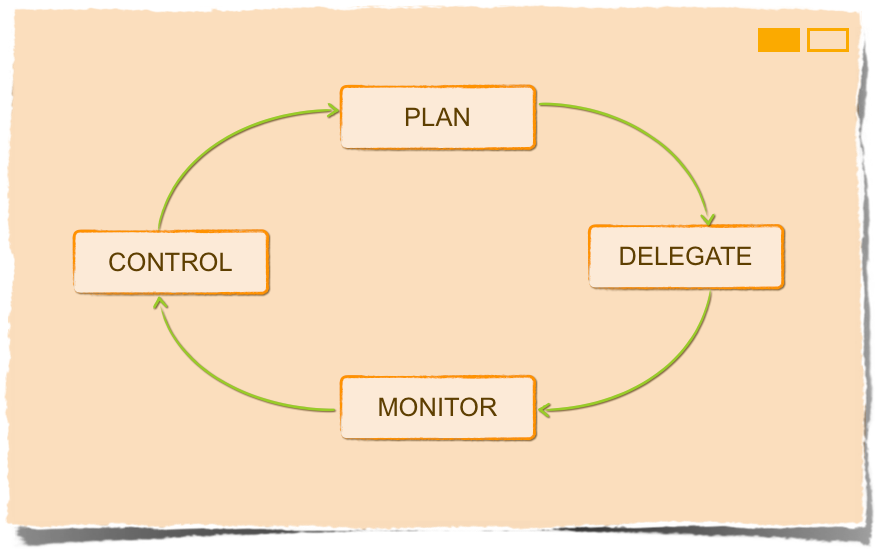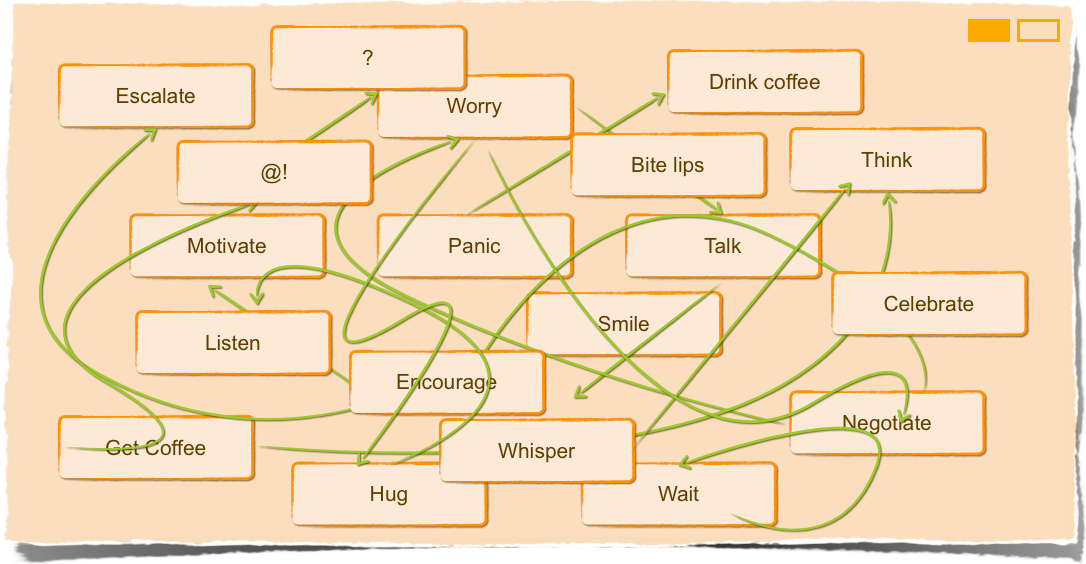What is the importance of different project types?
Now that we have established that there are different types of projects as well ways of identifying those, we need to answer the question what the importance of knowing the project type is.
As we have seen from the different attributes that determine the type of project, the main reason to know/determine the project type is that each requires a different leadership and management style.
Ralf Müller and Rodney Turner in a 2006 study in the International Journal of Project Management conclude that:
Without going too much into detail this conclusion makes a lot of sense as we can all appreciate that different situations require different approaches.
Looking at some of the project types they conclude as well:
- On medium complexity projects, emotional resilience and communication are important;
- On re-positioning projects, motivation is important, whereas on renewal projects, self-awareness and communication are important;
- On fixed price contracts, sensitivity and communication are important, whereas on re-measurement contracts influence and communication are Important;
- On home-based, multi-cultural projects, motivation and managing resources are important and strategic perspective detrimental.
So what does this mean?
It means a few things, first of all, something Müller and Turner do not address and that is, from the project manager's perspective, that you need to know what your strengths and weaknesses are. This may sound self evident and somewhat corny but it is very important because we as project managers have a tendency not to (be able) to say no and to take on any project that comes our way.
Secondly, now from the perspective of the Project Manager's manager, make sure to select the right project for the right project manager.
Lastly, from an project management office and organizational development perspective, when developing project managers and project management capabilities make sure to adopt the curricula to fit the expected project types and to address leadership (style) development.
Sources:
- Müller, R., & Turner, J. (2007). Matching the project manager’s leadership style to project type. International Journal Of Project Management, 25(1), 21-32. doi:10.1016/j.ijproman.2006.04.003
What does a Project Manager do?
In its most simple form a project manager does the following:
In essence the traditional Deming cycle of Plan-Do-Check-Act with a few name changes.
Key to the changes is that a project manager manages the project but does not do (most of) the project work himself.
In subsequent chapters we will delve deeper into each of these and provide more insight in what to do, how to do it, when to do it and most importantly why (or why not) to do it.
In all fairness we need to point out that the real things a project manager does can be be depicted as seen below:
We like to point out that the IPMA Competence Baseline (ICB®) provides a good overview of what a project manager is supposed to be able to do.
What is a Project?
This may seem a simple question with a simple answer but when we look at the multitude a definitions of what a project is, one might start to wonder if we can ever nail it down. Luckily when we look at some of the definitions there are some common characteristics.
First let's have a look a couple of definitions.
A project can be considered to be any series of activities and tasks that:
- Have a specific objective to be completed within certain specifications
- Have defined start and end dates
- Have funding limits (if applicable)
- Consume human and nonhuman resources (i.e., money, people, equipment)
- Are multi-functional (i.e., cut across several functional lines)1
A project is a sequence of unique, complex, and connected activities having one goal or purpose and that must be completed by a specific time, within budget, and according to specification.2
A project is a unique process consisting of a set of co-ordinated and controlled activities with start and finish dates, undertaken to achieve an objective conforming to specific requirements, including constraints of time, cost and resources.3
A project is a temporary organization that is created for the purpose of delivering one or more business products according to an agreed Business Case.4
A project consists of a unique set of processes consisting of coordinated and controlled activities with start and end dates, performed to achieve project objectives. Achievement of the project objectives requires the provision of deliverables conforming to specific requirements.5
A project is a temporary endeavour undertaken to create a unique product, service, or result.6
The two elements we see in each definition, albeit slightly different worded are: time bound and result oriented. In other words to create something within a certain time-frame. Other elements refine this by adding a specific focus - the business (case) - or approach - resources and control.
Another way of looking at it is by asking the question, "What is not a project?"
Not a project is running the organization on a daily business (unless you are in the project management business ;-). Changing the way the business is run can be considered a project.
Not a project is repetitive work such a operating a production line. Making (major) changes to the production line can be considered a project.
Not a project is the (dis)embarkation of passengers at the end/start of a cruise vacation. Improving the (dis)embarkation process for each port of call can be considered a project.
Running a charitable organziation on a daily basis is not a project. The annual major fundraising campaign can be considered a project
In other words, steady state, recurring stuff usually is not a project. Unique and/or major (recurring) stuff can be considered a project.
Finally, does it really matter? We can say that if one does all, or most of, the things considered to be within the domain of a project manager one is managing a project. We can also say, if they (whoever that may be, your boss, the management team, the board) call it a project you better do, or be able to do, whatever it is project managers are considered to be doing! In one of the following articles we will address that (whatever a pm is supposed to do/be doing).
See also:
Sources
1. PROJECT MANAGEMENT, A Systems Approach to Planning, Scheduling, and Controlling. Harold Kerzner, 8th Ed. ISBN 0471225770 John Wiley & Sons, Inc. 2002
2. Effective Project Management, Third Edition by Robert K. Wysocki and Rudd McGary ISBN:0471432210 John Wiley & Sons © 2003
3: ISO 10006:2003. Quality management systems - Guidelines for quality management in projects, 2003
4. Prince2. Managing Successful Project with Prince2, The Stationary Office, 2009
5: ISO 21500:2012. Project Management - Guidance on project management, 2012
6: A guide to the Project Management Body of Knowledge, 5th Ed. 2013{jcomments on}
What is a Project Manager
One who manages projects is a project manager! Is that true? In other words, anyone who manages a project or projects is a project manager? As per the defnition, yes. A project manager manages projects. However, one can and should argue that, the simple fact one is called a project manager or the simple fact that one manages projects does not make one a project manager!

Let us explain this.
First of all we have to consider whether the project is indeed a project. See What is a project? If whatever it is one manages does not fit the definiton of a project one can not be considered a project manager.
Secondly, the activities one does need to constitute "managing". See What is Project Management? In other words, if whatever it is one does cannot be considered "managing or taking care of or or handling", one can not be considered a project manager.
The next problem we encounter with this is that the term/profession 'project manager' is not a protected/regulated profession such as medical doctor or engineer, nurse or Colonel. Nor does it appear in many national and international job classifications. Anyone can call herself a project manager. Subsequently a lot of people do. A lot of them would not pass the simple litmus tests above. This (self) proclaiming and naming problem will not be solved (does it need solving?) unless there is a need to do so. So far that does not seem the case.
Good efforts are being made worldwide in defining what a project manager is or should be. Some examples are the IPMA Competence Baseline (ICB®) and the GAPPS Project Manager Standard. Both PMI's A Guide to the Project Management Body of Knowledge (PMBOK®) and ISO's ISO 21500:2012 Guidance on project management do mention the role of the project manager but not in depth.
For all purposes and intent we will stick with the simple definition of a Project Manager being someone who manages a project. In subsequent chapters we will explore a bit more what makes project manager differ from other managers and types of skills, competences and attitudes a project manager may want to posses and/or develop.
When is a project successful?
This seems a fairly straightforward and easy question. However, we will show that there are multiple ways of looking at this and that an answer may not always be so straightforward.
Is a project successful when it:
- is on time?
- is on budget?
- delivered a quality product?
- satisfies the users of the project deliverable(s)?
- ...?
The answer is, it depends!
It depends on the success criteria that were (or were not) established at the beginning of the project.
If the only criterion their was was to build a machine that goes "bleeb" when you turn it on and it just does that when you turn it on, success!
If the criteria were to build said machine within a year and it still had to go "bleeb" when you turn it on and you did that, success.
If you were late a day, partial success.
It depends on the business/organizational objective(s) the project is to achieve.
If the objective of the project is for instance, to reduce wait times and thus increasing customer satisfaction within three months after the project, by replacing the call centre system at a call centre operator, then the project is a success if the customer satisfaction indeed goes up.
If the above project had the additional success criterion that the project is not to cost more than a X the project is a success if it did not cost more than X. If it did cost more than X but still was able to satisfy the project objective than the project was a partial success.
When there is more than one criterion and when some of those criteria are related to the project objectives, as there should be, then you can see the question of project success becomes rather complicated.
For instance, in the above example of the call centre it is assumed (by the project owner) that there is a direct correlation and even causation between wait times and customer satisfaction. That seems an okay assertion. On the other hand, what if the new call centre system did indeed decrease wait times but also added one of those automated messages where you have to go through a slew of options before reaching (if ever) a real person and as a result decreased customer satisfaction?
What if there are no success criteria established at the start or during the project?
It is difficult if not impossible to measure something if you do not know what it is your are supposed to be measured against.
In other words, it is very important to clearly define what constitutes success but also to be very clear and specific on cause and effect including any assumptions you make with respect to causation and correlation.
As you can see there are many ways of looking at project (mangement) success.
Key point to note is that the sooner you, as the project manager or the project owner, establish the specific criteria for the project you are responsible for the better.
Having established the success criteria is of course no guarantee for success, it is merely an important first step!
See also:
More Articles...
Subcategories
-
Project Management General
This section deals with all general project (management) related content. Click there --> for all articles
-
Defining Project Management
There are lots of ways of looking at and discussing project management. This section will focus on providing clarification regarding common (and not so common) project management (related) definitions, concepts and terms.
-
Project (management) success
This section deals with the ever elusive project (management) success.
-
Project (management) organization
This section deals with all organizational aspects of projects and project management.
-
Project management process
This section approaches Project Management from a process perspective and takes you from start to finish and everything in between.
-
Defining Project Management
- Portfolio Management General
-
Project Management Standards, Methodologies and Models
Project Management Standards, Methodologies and Models
 The discipline of project management may, upon first glance seem a well defined profession. Nothing is farther from the truth in the sense that there are multiple standards, methdologies and models all trying to describe some, most or all (really?) aspects of "Project Management"Below you will find an overview of these standards, methdologies and models for as far as we at Ambidexter Management have been able to find.Some are international or national standards, some are proprietarry models owned by private companies and organizations, others are public domain and some are something else all together.For organizational sake we have, loosly arranged them as follows: (Complete List)
The discipline of project management may, upon first glance seem a well defined profession. Nothing is farther from the truth in the sense that there are multiple standards, methdologies and models all trying to describe some, most or all (really?) aspects of "Project Management"Below you will find an overview of these standards, methdologies and models for as far as we at Ambidexter Management have been able to find.Some are international or national standards, some are proprietarry models owned by private companies and organizations, others are public domain and some are something else all together.For organizational sake we have, loosly arranged them as follows: (Complete List)-
Standards
In this section you will find all project management related standards. The selection criterion was simple. If it has "standard" in the name and if it has a reference to projects or project management then it will be included.
-
Global Alliance for Project Performance Standards (GAPPS)
The GAPPS is a unique alliance of government, private industry, professional associations and training/academic institutes working together to develop globally applicable project management competency based standards, frameworks and mappings. The GAPPS standards and frameworks are intended to facilitate mutual recognition and transferabiltiy of project management qualifications.
The aim of the GAPPS is to provide the global project management community with information that is freely available for use by businesses, academic institutions, professional associations, and government standards and qualifications bodies globally. -
ISO Project Management Standards
ISO (International Organization for Standardization) is the world’s largest developer of voluntary International Standards. International Standards give state of the art specifications for products, services and good practice, helping to make industry more efficient and effective. Developed through global consensus, they help to break down barriers to international trade.ISO provides several standards direlctly or indirectly related to Project Management.
-
National Project Management Standards
Several national standards organizations have developed and made avaiable project management (related) standards. In this section all those national standards will be listed
-
Project Management Institue (PMI) Standards
In this section you will find all standards and frameworks owned by the Project Management Institute.
-
International Project Management Association (IPMA) Standards
In this section you will find all standards and frameworks owned by the International Project Management Association.
-
Global Alliance for Project Performance Standards (GAPPS)
-
Methodologies
In this section you will find methodologies (bodies of practice, procedures and rules specific to a certain discipline) related to project management. We divide them up in proprietary and public domain
-
Proprietary Project Management Methodologies
All these methodologies are either owned/used by a specific organization such as a corporation or a public entity.
-
Public Domain Project Management Methdologies
Although most so called public domain methodologies are not strictly public domain - there is often a registration mark holder or copy right holder - those that are placed in this category can be freely used and are freely available.
-
Proprietary Project Management Methodologies
-
Models
-
Standards




